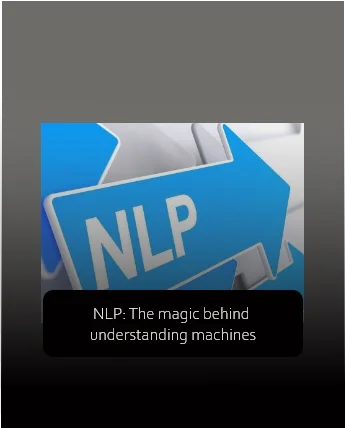NATURAL LANGUAGE PROCESSING
From text to knowledge in one step
Take understanding and support to your business with Natural Language processing. Allow machines to read, talk and write for you.


WHAT’S NLP?
Natural Language Processing (NLP) is a field of artificial intelligence that focuses on enabling machines to process, understand, and generate natural language. NLP uses computational techniques to analyse and extract meaning from human language. It has many practical applications, from language translation and sentiment analysis to chatbots.
Empowering Communication: NLP Expertise by EQUINOX AI LAB
TEXT CLASSIFICATION

SENTIMENT ANALYSIS
Sentiment focuses on analysing and categorising the emotional tone of texts. Using machine learning algorithms, sentiment analysis can automatically identify and classify text as positive, negative, or neutral based on its overall sentiment. This technology has numerous practical applications, from tracking consumer sentiment and improving marketing strategies to identifying trends in social media and monitoring public opinion. However, it also poses challenges, such as dealing with sarcasm, irony, and cultural nuances in language.
INTENTION DETECTION
Intention detection is a subfield of natural language processing that focuses on identifying the purpose or intention behind a given text. This technology uses machine learning algorithms to analyse and categorise whether a user is asking a question or expressing an opinion. Intention detection has numerous practical applications, including improving chatbot functionality and enhancing customer service interactions. However, it also presents challenges, such as dealing with ambiguity and understanding the context of language.


TOPIC CLASSIFICATION
Topic classification is a subfield of natural language processing that automatically categorises text into pre-defined topics or categories based on its content and context, such as identifying news articles by subject or grouping customer reviews by product category. Topic classification has numerous practical applications, including content moderation, and personalised recommendation systems.

INFORMATION EXTRACTION
Information extraction focuses on automatically identifying and extracting structured information from unstructured text. This technology involves using machine learning algorithms to analyse and extract specific types of information, such as named entities, relationships, and events. Information extraction has numerous practical applications, including data mining, knowledge management, and business intelligence. However, it poses challenges, such as identifying relevant information in noisy or incomplete text.
INFORMATION RETRIEVAL
Information finds and retrieves relevant information from extensive collections of unstructured text, such as documents or web pages. Machine learning algorithms analyse and rank text based on its relevance to a given query, such as a user search request. Information retrieval has numerous practical applications, including search engines, recommendation systems, and personalised content delivery.


VIRTUAL ASSISTANTS
Virtual assistants are software programs that use natural language processing (NLP) to interact with humans through spoken or written language. They use machine learning algorithms to understand user queries and generate appropriate responses, such as scheduling appointments, playing music, or providing weather forecasts. Virtual assistants have become increasingly popular, with many consumer electronics and smart home devices incorporating NLP technology.

ARE YOU READY?
Ask for a free trial, request a demo, request pricing or simply ask any question!!
